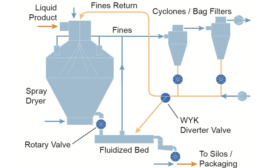Home » Keywords: » sanitary standards
Items Tagged with 'sanitary standards'
ARTICLES
Rather than a set of rigid detailed standards, GFSI operates as a benchmark system.
Read More
3-A SSI announces project to revise 3-A Sanitary Standard for General Requirements
This standard defines the general requirements for sanitary equipment intended for processing milk, milk products, foods, food ingredients, beverages or other edible materials.
September 22, 2021
3-A SSI releases revised accepted practice for installation, CIP of processing equipment
The new edition is compatible with FDA’s ‘Grade A’ Pasteurized Milk Ordinance and also contains requirements for non-PMO food processing applications.
July 7, 2021
3-A SSI announces on-site 2022 education program
The program will feature experts on a range of leading topics and issues in the hygienic design of food processing equipment.
July 1, 2021
3-A SSI China trademark attorneys issue advisory against counterfeits
A new advisory, published in English and Chinese, aims to stop Chinese companies that are falsely advertising themselves as being 3-A SSI authorized from marketing or sending such products to the United States.
September 15, 2020
3-A Sanitary Standards opens nominations for 2019 Volunteer Service Awards
The deadline for nominations is March 29.
January 9, 2019
Baby powders
Sanitary valves aid in hygienic processing of powdered products for infants
Germany’s Töpfer requires the highest hygienic standards for their powder rotary valves and diverter valves.
September 22, 2016
Stay ahead of the curve. Unlock a dose of cutting-edge insights.
Receive our premium content directly to your inbox.
SIGN-UP TODAYCopyright ©2025. All Rights Reserved BNP Media.
Design, CMS, Hosting & Web Development :: ePublishing





